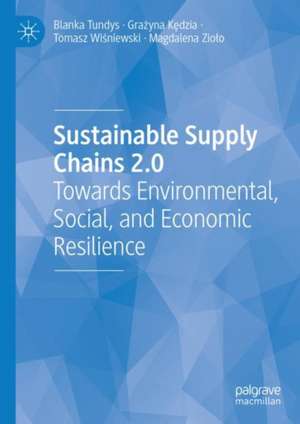Sustainable Supply Chains 2.0: Towards Environmental, Social, and Economic Resilience
Autor Blanka Tundys, Grażyna Kędzia, Tomasz Wiśniewski, Magdalena Ziołoen Limba Engleză Hardback – 14 mar 2024
By presenting a new model, Sustainable Supply Chain 2.0, this book combines academic theory with practical demonstration on how to build resilient supply chains that implement the principles of sustainable development. It will be of great interest to students of management, supply chain and logistics studies, as well as researchers in the field and business practitioners, including supply chain managers.
Preț: 725.92 lei
Preț vechi: 885.27 lei
-18% Nou
Puncte Express: 1089
Preț estimativ în valută:
138.90€ • 145.42$ • 114.93£
138.90€ • 145.42$ • 114.93£
Carte tipărită la comandă
Livrare economică 05-19 aprilie
Preluare comenzi: 021 569.72.76
Specificații
ISBN-13: 9783031503368
ISBN-10: 3031503368
Pagini: 184
Ilustrații: XVI, 184 p. 20 illus.
Dimensiuni: 148 x 210 mm
Greutate: 0.4 kg
Ediția:2024
Editura: Springer Nature Switzerland
Colecția Palgrave Macmillan
Locul publicării:Cham, Switzerland
ISBN-10: 3031503368
Pagini: 184
Ilustrații: XVI, 184 p. 20 illus.
Dimensiuni: 148 x 210 mm
Greutate: 0.4 kg
Ediția:2024
Editura: Springer Nature Switzerland
Colecția Palgrave Macmillan
Locul publicării:Cham, Switzerland
Cuprins
1. Introduction.- 2. Sustainable supply chain - a new paradigm for supply chain strategy.- 3. Challenges for resilient and sustainable supply chains.- 4. Modeling of sustainable supply chain 2.0. (Framework).
Notă biografică
Blanka Tundys is an Associate Professor at the Department of Logistics, Institute of Management, University of Szczecin, Poland. Her research interests focus on city logistics, smart city, resilience, uncertainty, green and sustainable supply chain, and closed-loop economy.
Grażyna Kędzia is an Assistant Professor at the University of Łódź, Poland. She specialises in the field of logistics and supply chain management, risk and business continuity management, supply chain resilience and design for circularity.
Tomasz Wiśniewski is a Lecturer at the University of Szczecin, Poland. He specializes in the field of statistics, econometrics, applications of mathematics, operations research, modeling and simulation of logistic processes, multi-criteria methods in process optimization, and others.
Magdalena Ziolo is a Professor at the University of Szczecin, Poland. Her research and teaching scope is in finance and banking, especially sustainable finance and green banking, sustainable development and public finance.
Grażyna Kędzia is an Assistant Professor at the University of Łódź, Poland. She specialises in the field of logistics and supply chain management, risk and business continuity management, supply chain resilience and design for circularity.
Tomasz Wiśniewski is a Lecturer at the University of Szczecin, Poland. He specializes in the field of statistics, econometrics, applications of mathematics, operations research, modeling and simulation of logistic processes, multi-criteria methods in process optimization, and others.
Magdalena Ziolo is a Professor at the University of Szczecin, Poland. Her research and teaching scope is in finance and banking, especially sustainable finance and green banking, sustainable development and public finance.
Textul de pe ultima copertă
Sustainable supply chains are one of the development trends of modern business strategies. They are a response to economic challenges and trends, while at the same time being a creator of value and competitive advantage. This book identifies environmental, social, and economic issues not only as the basis for configuring a sustainable supply chain, but also as important determinants of supply chain resilience.
By presenting a new model, Sustainable Supply Chain 2.0, this book combines academic theory with practical demonstration on how to build resilient supply chains that implement the principles of sustainable development. It will be of great interest to students of management, supply chain and logistics studies, as well as researchers in the field and business practitioners, including supply chain managers.
By presenting a new model, Sustainable Supply Chain 2.0, this book combines academic theory with practical demonstration on how to build resilient supply chains that implement the principles of sustainable development. It will be of great interest to students of management, supply chain and logistics studies, as well as researchers in the field and business practitioners, including supply chain managers.
Blanka Tundys is an Associate Professor at the Department of Logistics, Institute of Management, University of Szczecin, Poland. Her research interests focus on city logistics, smart city, resilience, uncertainty, green and sustainable supply chain, and closed-loop economy.Grażyna Kędzia is an Assistant Professor at the University of Łódź, Poland. She specialises in the field of logistics and supply chain management, risk and business continuity management, supply chain resilience and design for circularity.
Tomasz Wiśniewski is a Lecturer at the University of Szczecin, Poland. He specializes in the field of statistics, econometrics, applications of mathematics, operations research, modeling and simulation of logistic processes, multi-criteria methods in process optimization, and others.
Magdalena Ziolo is a Professor at the University of Szczecin, Poland. Her research and teaching scope is in finance and banking, especially sustainable finance and green banking, sustainable development and public finance.
Tomasz Wiśniewski is a Lecturer at the University of Szczecin, Poland. He specializes in the field of statistics, econometrics, applications of mathematics, operations research, modeling and simulation of logistic processes, multi-criteria methods in process optimization, and others.
Magdalena Ziolo is a Professor at the University of Szczecin, Poland. Her research and teaching scope is in finance and banking, especially sustainable finance and green banking, sustainable development and public finance.
Caracteristici
Covers key topics related to supply chains in the context of current operational challenges Explores the role of financial markets in strengthening the resilience of sustainable supply chains Creates a model of a sustainable and resilient supply chain, whose determinants are ecological, social, and economic
